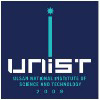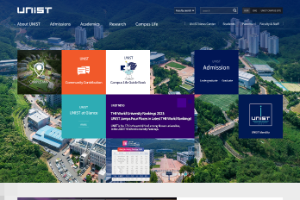Ulsan National Institute of Science and Technology

Ulsan National Institute of Science and Technology (UNIST) is a public research university located in Ulsan, South Korea. It is one of the four public universities in South Korea which are dedicated to research in science and technology, along with KAIST, GIST, and UST.
The history of Ulsan National Institute of Science and Technology (UNIST) can be traced back to 2001, when the citizens of Ulsan gathered to form an organization for the establishment of a national university in the city. This organization, named the Ulsan Citizen Organization of National University, was composed of 160 organizations with around 2,000 members.
In 2007, the UNIST bill was passed in the national assembly, and UNIST was officially founded. The university welcomed its first class of undergraduate students in 2009.
At the time of its foundation, UNIST was known for being the first national university in South Korea to be incorporated and thus administered by an independent board of trustees despite being funded by the central government. This gave UNIST a greater degree of autonomy and flexibility than other national universities in South Korea.
In 2015, UNIST was recognized as one of the four government-funded research institutes in Korea. This was a major step in realizing UNIST's vision to be ranked in the top 10 of globally competitive universities by 2030.
Since its founding, UNIST has grown to become one of the leading universities in science and technology education and research in South Korea. The university has a strong focus on innovation and entrepreneurship, and its graduates have gone on to start successful companies in a wide range of industries.
Based on the QS World University Rankings of 2025, Ulsan National Institute of Science and Technology is positioned as the #280 top university in the world, which makes it the #8 top university in South Korea. The university's global rank decreased by 14 points from last year.
Institute Profile
Get a quick snapshot of the institute's key details.
| 2025 Ranking | #8 |
|---|---|
| University Name | Ulsan National Institute of Science and Technology |
| Name in Local Language | 울산과학기술원 |
| Acronym | UNIST |
| Year Established | 2007 |
| Motto | First in Change |
| Colors | UNIST Navy, UNIST Emerald |
Location
The institute is located in Ulsan. Find the address and map of the institute below.
| Address | 50, UNIST-gil, Ulsan, South Korea |
|---|---|
Contact
Connect with the institute easily! Find their contact details.
| Fax | +82-52-217-0114 |
|---|---|
| Website |

|
| More Links |
Admission Info
Find information below on admission to Ulsan National Institute of Science and Technology.
| Undergraduate Admission Info | Click here |
|---|---|
| Graduate Admission Info | Click here |
Scholarship and Financial Aids
Click on the following links to get information on scholarships and/or financial aids offered by Ulsan National Institute of Science and Technology.
| Scholarship Info | Click here |
|---|---|
| More Info | Click here |
Programs and Courses
Get a quick overview of programs and courses offered at this institute.
| Bachelor's Degrees | Master's Degrees | Doctorate Degrees | Diplomas | |
|---|---|---|---|---|
| Arts & Humanities | n/a | n/a | n/a | n/a |
| Business & Social Sciences | n/a | n/a | ||
| Engineering | n/a | |||
| Language & Cultural Studies | n/a | n/a | n/a | n/a |
| Medicine & Health | n/a | n/a | n/a | n/a |
| Science & Technology | n/a |
Click on the following button to explore a detailed list of programs and courses of this institute.
View Course ListRanking History
Ulsan National Institute of Science and Technology has persistently ranked as the 8th top university in South Korea throughout the last 4 years.
Related Articles
Stay informed with the following articles related to the institute or higher education in South Korea.
